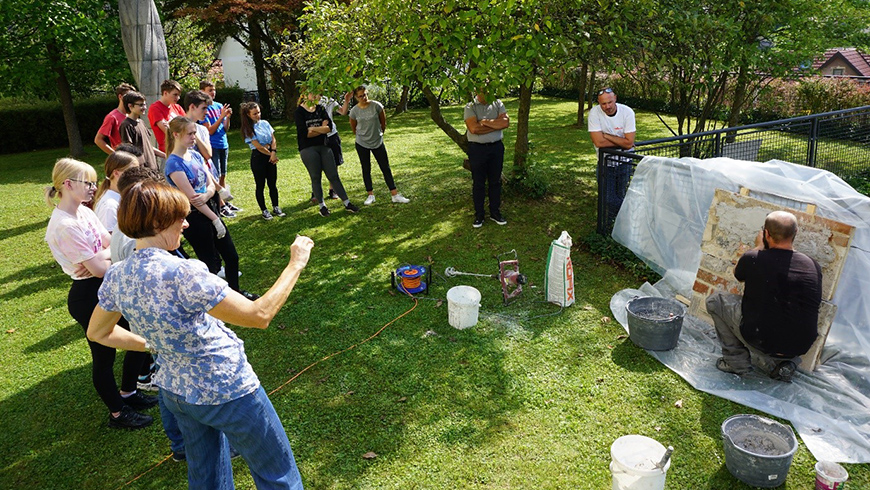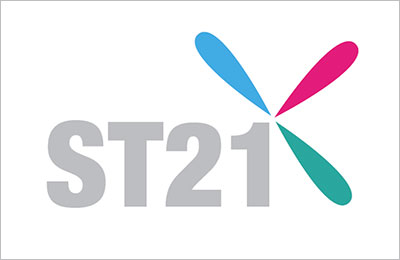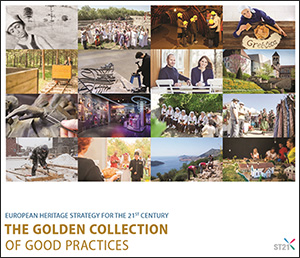Location of the initiative:

Initiator
Idrija 2020 Association
Relation to Strategy 21 Recommendations:
D5 - Encourage the reuse of heritage and use of traditional knowledge and practice
Time span of the initiative:
Start date: 2018 / End date: ongoing
Motivation / Methodology
For us, the members of Idrija 2020 youth association from a small former mining town of Idrija (UNESCO World Heritage List), heritage is a resource of inspiration, not a barrier. History teaches us that as Idrija grew into one of most densely populated industrial areas in today’s Slovenia, the typical miners’ houses began to appear on the slopes around the centre of the town. They were built by the workers themselves and were never meant to house just one family – each house functioned as a lively organism of working-class landlords and tenants. Placed apart from one another, with their slender white facades and steep roofs, the miner’s houses in Idrija created a typical image of the mining town that persisted well into the 20th century. Today, only a few authentic examples of the traditional miners’ housing in Idrija bear witness to once bustling construction activity of the golden age of Idrija Mercury Mine. As inhabitants of Idrija we feel responsible for protecting and supporting the rich cultural heritage that our ancestors left to us. Therefore, in 2018 we started with the initiative to renovate one of the traditional miners’ houses and give it a new, modern content. As one miners’ house was reconstructed as a museum house, there was a common (mis)conception in the population that old houses are only suitable for museum purposes and are burden for community. For us, they represented an opportunity and one of the goals of the initiative was to encourage local community to start feeling the same. Together with the Municipality of Idrija and Cultural Association prostoRož from Ljubljana we started the research on the situation in Idrija and found out that there are 102 miners’ houses still preserved in the town. A far bigger number than we estimated. Many of them are in a bad shape, half of them empty. In a time when Idrija and its surroundings are facing a dire lack of apartments, this is a problem worth discussing. As miners’ houses are perfect example of sustainable housing, renovation of the old miners’ houses would be a perfect way of solving the lack of apartments in Idrija.
In order to simplify renovation and improve the living conditions of the owners, the current and the future inhabitants, we have prepared a catalogue of architectural and construction measures on how to renovate Idrija miners’ houses. In the cooperation with partners we’ve prepared a plan for a pilot project – reconstruction of the Trnovec house in Idrija. The house is planned to be renovated in the following years to serve as a modern home with 2 apartments for young families. As the project had large following from the community of Idrija, we’ve organized architectural and construction consultations for owners of the decaying miners’ houses. With our help owners started to understand the opportunity and positive benefits of reconstruction. We’ve published a booklet with available financial grants for owners of old houses in Slovenia. In 2020, we have together with our partners facilitated writers’ residency with 2 selected Slovenian writers who worked for one month in the typical miners’ house. We’ve prepared urban game through which visitors learn interesting facts about miners’ houses in playful way and a specialised architectural guided tour. Moreover, an ongoing research into the ethnography of Idrija miners' house continues. Our work is more and more dedicated towards education. We’ve prepared educative workshops for students about the importance of sustainable building constructions and materials (combining mathematics, geography, photography, architecture and sociology). By approaching schools, built heritage can be a focus point for development of integral approach which incorporates STEAM education methods. The starting plans of the initiative were to:
- Raise awareness about the miners’ houses, sustainable construction and materials; importance of the miners’ houses for regional identity,
- Encourage the reuse of built heritage for different purposes (for living or different activities – gallery, tourist apartments …),
- Support the transfer of knowledge to young people about specific skills regarding miners’ houses,
- Encourage new initiatives by the local community and support authorities in dealing with old decaying houses,
- Promote miners’ houses as a lively place to live or meet,
- encourage the involvement of citizens and local authorities in capitalizing on their everyday heritage.
Obstacles / Barriers
When we started to work on the initiative to preserve and revitalize miners’ houses, we’ve realized that people see them as a burden and were pessimistic about the impact of our work. Some owners were also suspicious of our activities, as they thought that our only goal is to protect old houses. We’ve realized that many owners don’t have a strong opinion, what to do with the existing buildings – they don’t have the will or the money to renovate and leave their decisions to their children. Many people also don’t see positive benefits of the sustainable materials and renovation of the old houses. It’s interesting that although they have very strong local identity, they don’t find miners’ houses as part of this identity. They believe that it’s only the matter of museum activities. Another obstacle is in the fact that there is a lack of skilled workers, who have skills to work at these houses. As there is a lack of development of these skills in Slovenia, we hope that in the future there will be more solutions in this direction. One of the plans on how to raise awareness about the need of reconstruction of the old miners’ houses is to engage young people who will play an important role in the society in future. Main goal is to encourage young people to develop skills and knowledge needed to renovate old houses.
Change / Impact
Many residents of Idrija have started to realize the importance of the built heritage. They see miners’ houses more and more as an opportunity, especially in tourism. Our activities had positive impact on the owners of miners’ houses. Municipality of Idrija has started to see miners’ houses as an opportunity to solve lack of apartments of Idrija. Unfortunately, there’s no fund yet by the government which would financially cover the costs of old house reconstruction (more than 100 years old). Young people in Idrija are starting to understand the value of the miners’ houses. Participants at students’ workshop started to look at heritage in new interdisciplinary way.
Lessons learned
We’ve realized that reconstruction of the miners’ houses is also connected with the community awareness about the heritage. Many residents at first didn’t realize the value of their property. We’ve learned that we need to emphasize economic, environmental, social and cultural benefits of reconstructions. For many, economical value is the most important, but there is a growing awareness of a broader social impact. We’ve also learned that there is a big difference in opinion of young and old people. Old people have very strong memories of their life in the house and are therefore normally against the demolition of the building. They don’t find the economic value as the priority. Younger people are not so associated with the building, for them economical value is the most important one. Sometimes they see bigger value in plot than in the building itself. An important lesson for us was the realization about just how much the inclusion of various institutions (heritage protection, local authorities) and the local community (owners, professionals) into the work process from its very beginning can benefit our cause in the long run. We’ve facilitated the dialog between the Municipality, the regional branch of Institute for Cultural Heritage Protection, the local museum on one hand, and the architects, civil engineers, owners of miners’ houses and the wider local community on the other. Through organizing round table debates, presentations and exhibitions (Idrija, Ljubljana) we were able to invigorate the sense of importance of protecting and living with heritage. With such methods an inclusive horizontal link was established among stakeholders on the local and regional levels to prove one point: cultural heritage is worth protecting!
Online resources
- Booklet about the existing work on the project
- Blog post about renovation plan and measures calatogue
- newly established webpage of the project (still in the work)
Contact information
Contact person: Matevž Šlabnik
Organisation: Idrija 2020 Association
Email: [email protected]
Phone: +386 51 411 388
Website: http://www.idrija2020.si/
Facebook: https://www.facebook.com/idrija2020/
Instagram: https://www.instagram.com/id20_institute/
Source of financing
Public financing:
- Eco Fund, Slovenian Environmental Public Fund
- European fund for regional development
- Ministry of the Environment and Spatial Planning of the Republic of Slovenia





